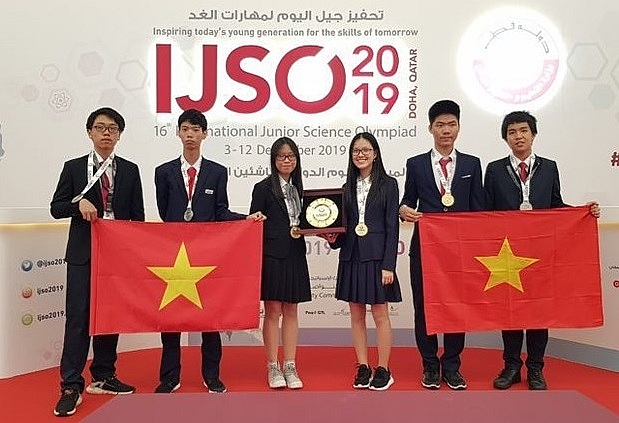Vietnamese students win three golds, three silvers at IJSO
 |
| Vietnamese students at the 16th International Junior Science Olympiad (IJSO) 2019. (Source: vietnamnet.vn) |
The 16th IJSO was co-organised by Qatar’s Ministry of Education and Higher Education and Qatar University, from December 3-12 under the slogan ‘Inspiring Today’s Young Generation for the Skills of Tomorrow’.
The gold medalists are Dam Gia Bao, Nguyen Tri Duc and Cao Thuy An, all 10th-grade students of Hanoi Amsterdam High School for the Gifted.
The silver medal winners were Dang Minh Trung and Nguyen Hoang Trung, 10th-grade students of the Hanoi Amsterdam High School for the Gifted, and Nguyen Dinh Hieu, a 10th-grade student of Hanoi’s Nguyen Hue High School.
This is the 9th year the Hanoi Department of Education and Training was assigned by the Ministry of Education and Training and the Hanoi People's Committee to select and set up a national team representing the country for the IJSO.
A total of 326 students aged 15 years and younger, from 70 countries and territories around the world, have met during the 16th IJSO to test their knowledge and skills in physics, biology and chemistry.
Students passed three tests including multiple-choice examination, theoretical examination and practical examination.
The IJSO is an annual individual and team competition in the natural sciences for students who are under sixteen years old.
The first IJSO was held in 2004 in Jakarta, Indonesia.
Every year, the contest is held in different countries with the purpose of creating a competition of knowledge, encouraging students to approach practical scientific knowledge around the world.
This is also an annual destination for nations to share education experiences in order to develop the quality of education and create momentum for global education cooperation.
In addition, it creates opportunities for cultural exchange between students and teachers in the scientific community.
What the stars mean:
★ Poor ★ ★ Promising ★★★ Good ★★★★ Very good ★★★★★ Exceptional
Related Contents
Latest News
More News
- Congratulations from VFF Central Committee's int’l partners to 14th National Party Congress (January 25, 2026 | 09:46)
- List of newly-elected members of 14th Political Bureau announced (January 23, 2026 | 16:27)
- 14th Party Central Committee unanimously elects To Lam as General Secretary (January 23, 2026 | 16:22)
- List of members of 14th Party Central Committee announced (January 23, 2026 | 09:12)
- Highlights of fourth working day of 14th National Party Congress (January 23, 2026 | 09:06)
- Press provides timely, accurate coverage of 14th National Party Congress (January 22, 2026 | 09:49)
- Press release on second working day of 14th National Party Congress (January 22, 2026 | 09:19)
- Minister sets out key directions to promote intrinsic strength of Vietnamese culture (January 22, 2026 | 09:16)
- 14th National Party Congress: Renewed momentum for OVs to contribute to homeland (January 21, 2026 | 09:49)
- Party Congress building momentum for a new era of national growth (January 20, 2026 | 15:00)

 Tag:
Tag:




















 Mobile Version
Mobile Version